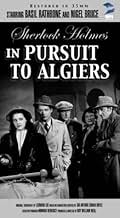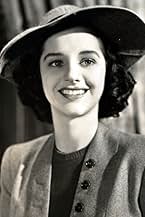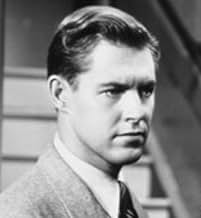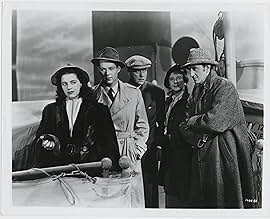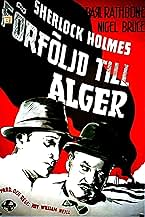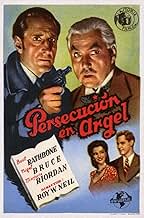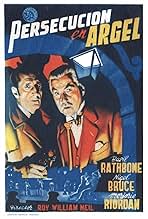IMDb रेटिंग
6.7/10
4.4 हज़ार
आपकी रेटिंग
अपनी भाषा में प्लॉट जोड़ेंHolmes is recruited to escort the heir to a European throne safely back to his homeland after his father's assassination.Holmes is recruited to escort the heir to a European throne safely back to his homeland after his father's assassination.Holmes is recruited to escort the heir to a European throne safely back to his homeland after his father's assassination.
- निर्देशक
- लेखक
- स्टार
William 'Wee Willie' Davis
- Gubec
- (as Wee Willie Davis)
Frederick Worlock
- Prime Minister
- (as Frederic Worlock)
Wilson Benge
- Clergyman
- (बिना क्रेडिट के)
Sven Hugo Borg
- Johansson
- (बिना क्रेडिट के)
Ernst Brengt
- Ship Passenger
- (बिना क्रेडिट के)
James Carlisle
- Aide
- (बिना क्रेडिट के)
Ashley Cowan
- Steward
- (बिना क्रेडिट के)
James Craven
- Anton Petzval
- (बिना क्रेडिट के)
फ़ीचर्ड समीक्षाएं
The definitive movie Sherlock Holmes is Basil Rathbone; the definitive movie Dr. Watson is Nigel Bruce. Together, these two brilliant actors made fourteen Sherlock Holmes films between 1939 and 1946, most of them loosely based on stories by Arthur Conan Doyle; a few based on Doyle stories in name only. All are thrilling, exciting excursions into the realm of mystery and deductive reasoning, even the later low-budget ones.
The original pairing of the super sleuth with his bumbling if lovable assistant portrayed by Rathbone and Bruce was in "The Hound of the Baskervilles," where star billing went to Richard Greene as Sir Henry Baskerville. The popularity of Holmes and Watson showed the studio that the audience cared more for the two supporting players than for the somewhat stiff Greene. Next time in "The Adventures of Sherlock Holmes," Rathbone and Bruce deservedly received top billing.
During World War II with England in peril from the Luftwaffe, Holmes and Watson were utilized to booster the war spirit. Holmes could be heard at the end of the war-time films haranguing his fellow countrymen and their ally, the United States, about patriotism and gallantry. Winston Churchill was touted as the savior of his nation.
"Pursuit to Algiers," based on Doyle's "The Return of Sherlock Holmes," finds the crafty detective helping escort Nikolas (Leslie Vincent), heir of a foreign country and a target for conspirators, to assume his crown following the assassination of his predecessor. There are many clever scenes involving Dr. Watson unknowingly being used as a decoy to protect Nikolas. When Nikolas' supporters first contact Holmes surreptitiously, they employ a ruse involving a fish and chips cypher, beyond Watson's grasp. In the process Watson is propositioned by a hooker who calls the good doctor, Ducky, much to his chagrin. Holmes takes the high road by plane; Watson takes the low road by boat. There is much chicanery aboard the ship that takes up most of the movie. The ending may come as a surprise for many.
One of the high points of "Pursuit to Algiers" is Watson's story of "The Giant Rat of Sumatra." Entreated by his fellow passengers to tell about one of Sherlock Holmes' greatest adventures, Watson volunteers to entertain all with his giant rat fable. His use of inanimate objects on the table for purposes of illustration to make the exploits he relates more colorful is well worth the price of admission.
There are more songs than usual for a Sherlock Holmes outing. Such traditional Scottish airs as "Flow Gently Sweet Afton," sung by Marjorie Riordan as a girl from Brooklyn named Sheila Woodbury with something hidden in her sheet music satchel and "Loch Lomond," sung by Watson himself, not only serve as icing but are utilized to embellish the plot.
The twelfth in the Sherlock Holmes series and coming at the end of the war, "Pursuit to Algiers" is one of the most entertaining of the lot and there is no rousing speechifying by Holmes at the end. Those speeches were wonderful morale buildings at the time, but are a bit quaint for today's audiences.
The original pairing of the super sleuth with his bumbling if lovable assistant portrayed by Rathbone and Bruce was in "The Hound of the Baskervilles," where star billing went to Richard Greene as Sir Henry Baskerville. The popularity of Holmes and Watson showed the studio that the audience cared more for the two supporting players than for the somewhat stiff Greene. Next time in "The Adventures of Sherlock Holmes," Rathbone and Bruce deservedly received top billing.
During World War II with England in peril from the Luftwaffe, Holmes and Watson were utilized to booster the war spirit. Holmes could be heard at the end of the war-time films haranguing his fellow countrymen and their ally, the United States, about patriotism and gallantry. Winston Churchill was touted as the savior of his nation.
"Pursuit to Algiers," based on Doyle's "The Return of Sherlock Holmes," finds the crafty detective helping escort Nikolas (Leslie Vincent), heir of a foreign country and a target for conspirators, to assume his crown following the assassination of his predecessor. There are many clever scenes involving Dr. Watson unknowingly being used as a decoy to protect Nikolas. When Nikolas' supporters first contact Holmes surreptitiously, they employ a ruse involving a fish and chips cypher, beyond Watson's grasp. In the process Watson is propositioned by a hooker who calls the good doctor, Ducky, much to his chagrin. Holmes takes the high road by plane; Watson takes the low road by boat. There is much chicanery aboard the ship that takes up most of the movie. The ending may come as a surprise for many.
One of the high points of "Pursuit to Algiers" is Watson's story of "The Giant Rat of Sumatra." Entreated by his fellow passengers to tell about one of Sherlock Holmes' greatest adventures, Watson volunteers to entertain all with his giant rat fable. His use of inanimate objects on the table for purposes of illustration to make the exploits he relates more colorful is well worth the price of admission.
There are more songs than usual for a Sherlock Holmes outing. Such traditional Scottish airs as "Flow Gently Sweet Afton," sung by Marjorie Riordan as a girl from Brooklyn named Sheila Woodbury with something hidden in her sheet music satchel and "Loch Lomond," sung by Watson himself, not only serve as icing but are utilized to embellish the plot.
The twelfth in the Sherlock Holmes series and coming at the end of the war, "Pursuit to Algiers" is one of the most entertaining of the lot and there is no rousing speechifying by Holmes at the end. Those speeches were wonderful morale buildings at the time, but are a bit quaint for today's audiences.
Pursuit To Algiers involves Sherlock Holmes and Dr. John Watson in a job of security more than detective work. Both are looking to get away to Scotland for a little rest and relaxation, but they get a curious call for help from the Prime Minister of some Balkan country where the king has died. Not by accident as reported, but was assassinated.
The Holmes mission is to get the Crown Prince to Algiers where presumably the state security people will take over. Why Algiers is never mentioned.
As Basil Rathbone so wisely puts it he dislikes plans made by other people as they have a habit of blowing up in their faces. Rathbone makes his own security arrangements and part of it is making poor Nigel Bruce a decoy in more ways than one. How he succeeds in his mission is quite a good tale.
Favorite scenes in this is Nigel Bruce singing Loch Lomond after singer Marjorie Riordan obliges him with a rendition of Flow Gently Sweet Afton. Nigel Bruce does not do bad with it either. The second scene is Rathbone outsmarting one of the three villains on a ship to Algeria. Martin Kosleck who is best known for playing Joseph Goebbels in several wartime films of varying quality plays an assassin skilled with the use of a thrown knife. I love how Rathbone not only foils him, but decommissions Kosleck for the rest of the film.
Pursuit To Algiers is not pure Holmes in terms of a faithful recreation of an Arthur Conan Doyle, but Rathbone and Bruce are in good form and back from wartime propaganda films and now doing good mysteries.
The Holmes mission is to get the Crown Prince to Algiers where presumably the state security people will take over. Why Algiers is never mentioned.
As Basil Rathbone so wisely puts it he dislikes plans made by other people as they have a habit of blowing up in their faces. Rathbone makes his own security arrangements and part of it is making poor Nigel Bruce a decoy in more ways than one. How he succeeds in his mission is quite a good tale.
Favorite scenes in this is Nigel Bruce singing Loch Lomond after singer Marjorie Riordan obliges him with a rendition of Flow Gently Sweet Afton. Nigel Bruce does not do bad with it either. The second scene is Rathbone outsmarting one of the three villains on a ship to Algeria. Martin Kosleck who is best known for playing Joseph Goebbels in several wartime films of varying quality plays an assassin skilled with the use of a thrown knife. I love how Rathbone not only foils him, but decommissions Kosleck for the rest of the film.
Pursuit To Algiers is not pure Holmes in terms of a faithful recreation of an Arthur Conan Doyle, but Rathbone and Bruce are in good form and back from wartime propaganda films and now doing good mysteries.
While this is contrived and silly at times, the best part of it, for me, was the fact that everyone knows what Holmes is up to and he still manages to come out on top. There are two plots at work here. One has to do with the transporting of stolen emeralds and the other the transporting of royalty. On numerous occasions, Holmes turns the tables on his adversaries. The dangers are everywhere and his head spins like an owls as he peers over his shoulder, through the fog, and through portholes. He sets up a wonderful ruse. The men who are out to squelch his efforts are really interesting: a mute thug who uses sign language, a wiry Peter Lorre type with a foreign accent, and a sort of Sydney Greenstreet wannabe. Watson becomes enamored with a pretty young singer who is carrying around secrets. He even belts out his own version of "Loch Lomond" and he proves to have quite a beautiful voice. Without giving anything away, Holmes keeps his cards close to his vest until the denouement. He suspects no one; he suspects everyone. I think this is a lesser effort, but still a lot of fun.
Please make sure and get the UCLA restored version of this classic on DVD. There are some appalling Public Domain versions of the Rathbone/Bruce series floating about, especially in the U.K., which seem to have been ripped from poor quality VHS tapes, and they're worse than VCD quality. You'll certainly enjoy this series even more if you see them in good quality prints. Pursuit To Algiers is not the best of the series - that honour goes to SH and the Spider Woman - but it's very certainly worth watching, as it contains some delightful moments, although the storyline is a bit thin. Poor old Watson is put upon, as usual, while Holmes has, at least, the sense to keep his hair tidily back-combed in this episode, unlike others in the series where his barnet is all over the place. This is one to come back to again and again - a cosy evening in front of the fire, and Holmes and Watson off on a chase. But remember! Do yourself and your family a favour and get the RESTORED version. Avoid the market cheapies!
I've seen nearly all of Universal's Sherlock Holmes series by now, and have found that the level of quality doesn't vary too much between each instalment. Every entry in the series is worth watching, and I haven't seen any that I would describe as 'bad'. Pursuit to Algiers fits into this equation snugly, but even so; it's definitely one of the lesser Holmes mysteries. It does feature most of what makes the series great beyond the central plot line - such as a great performance from both the leads, a constant stream of intrigue and some great dialogue; but the actual mystery itself is rather lazy. It simply follows Holmes and Watson looking after a prince onboard a ship full of assassins. Adding to this is the fact that the sets are fairly samey, which doesn't help the film as it a few changes of scenery wouldn't have gone amiss. The film seems to know that it isn't the greatest of Holmes mysteries as well; and this translates to the screen. Holmes himself doesn't appear in the film for a proportion of the running time, which is never good when he's the main reason people are watching; and as good as Nigel Bruce is, he's not enough to carry a film about the great literary detective all on his own. I much prefer it when LeStrade features as well. Still, despite it's bad points, Pursuit to Algiers is a worthy yarn and still worth seeing for fans of these films.
क्या आपको पता है
- ट्रिवियाThe film contains a couple of clever in-jokes for Holmes aficionados in the form of references to famous unrecorded cases for the Great Detective: at one point Watson begins to recite the tale of The Giant Rat of Sumatra (mentioned in Conan Doyle's "The Adventure of the Sussex Vampire"); whilst the action takes place aboard the S.S. Friesland (from Conan Doyle's "The Adventure of the Norwood Builder", and alluded to as "a Dutch-American liner" in his Professor Challenger book "The Lost World", though here it has links to Malmö in Sweden). The film also borrows some characters and events from "The Adventure of the Red Circle."
- गूफ़Dr Watson discovers an automatic pistol --- i.e., one with a slide-in ammo-clip instead of a rotating cylinder --- in a lady passenger's handbag. He consistently refers to the handgun as a revolver. An ex-Army officer like Watson, no matter how daft, would never make such an "obvious" mistake.
- भाव
Sherlock Holmes: Possibly, poison is a woman's weapon.
- कनेक्शनEdited into Who Dunit Theater: Sherlock Holmes and Pursuit to Algiers (2021)
टॉप पसंद
रेटिंग देने के लिए साइन-इन करें और वैयक्तिकृत सुझावों के लिए वॉचलिस्ट करें
- How long is Pursuit to Algiers?Alexa द्वारा संचालित
विवरण
- रिलीज़ की तारीख़
- कंट्री ऑफ़ ओरिजिन
- भाषा
- इस रूप में भी जाना जाता है
- Sherlock Holmes in Pursuit to Algiers
- फ़िल्माने की जगहें
- उत्पादन कंपनी
- IMDbPro पर और कंपनी क्रेडिट देखें
- चलने की अवधि
- 1 घं 5 मि(65 min)
- रंग
- पक्ष अनुपात
- 1.37 : 1
इस पेज में योगदान दें
किसी बदलाव का सुझाव दें या अनुपलब्ध कॉन्टेंट जोड़ें

